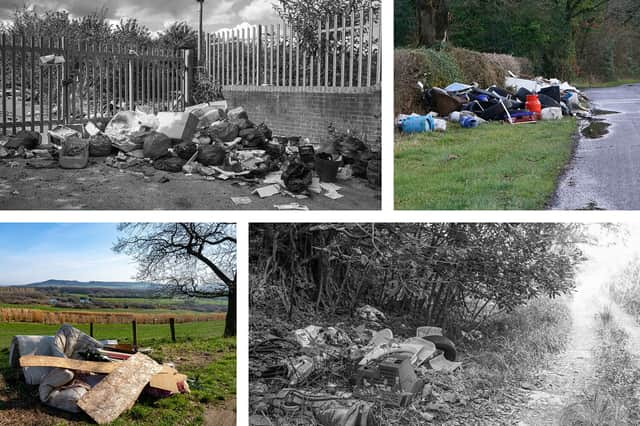Exclusive:Fly-tipping: the councils that are soft on the crime - with many let off with warning letters


Fly-tippers in the North East may be getting away with lighter punishments than elsewhere in England, with councils in the region far more likely to hand out warning letters to people caught offloading their rubbish.
Keir Starmer recently warned that a Labour government would “punish fly-tippers” by making them join ‘clean up squads’ to remove dumped waste. Under Labour’s plans councils would be able to make fly-tippers clear up waste they had dumped through new Fixed Penalty Cleaning Notices.
Advertisement
Hide AdAdvertisement
Hide AdLocal authorities are already responsible for taking action against fly-tippers and have a variety of options available, ranging from warning letters to prosecution – but government figures show geographical inconsistencies in how punishments are handed out by councils. Whereas some councils fined fly-tippers in 100% of cases, others gave mere warning letters 100% of the time.
In the 12 months to April 2022, 20% of actions taken against fly-tippers in the North East resulted in a warning letter – double the proportion of England’s national average of 11% and greater than any other region in the country, according to data published by the Department for Environment Food and Rural Affairs (DEFRA). It is also three times greater than in the South East which had 6% of actions resulting in a warning letter, the lowest proportion. It is not known how severe the incidents were.
Fixed penalty notices (FPNs), which can be as much as £1,000, were also issued to fly-tippers at varying rates. More than a quarter (27%) of actions taken by councils in London resulted in a FPN, 1.5 times as much as the national average of 18%, while just 4% of actions taken by authorities in Yorkshire and The Humber ended up in a FPN.
Prosecutions for dumping waste remain significantly low, and are at largely similar levels across all regions. Since 2007/08, 30,000 prosecutions have been made by councils against fly-tippers, representing fewer than 1% of all actions taken. Last year 0.4% of actions resulted in a prosecution in England. No region had a prosecution rate above 1%.
Advertisement
Hide AdAdvertisement
Hide AdLoading....
Overall, investigations were the most common (61.5%) type of action taken by authorities against fly-tippers. This happens when a local enforcement team has recorded a fly-tipping incident, identified the evidence available and has either decided the action to be taken or is considering.
Fly-tipping remains a major environmental issue for councils with 1.1 million incidents recorded by authorities last year, however there has been a modest improvement in the past year with the figure dropping 4.2% on 2020/21 figures. The government said it is making “solid progress” on the issue.
Warning letters, fines and prosecutions
At a local level Arun was found to have sent out the greatest proportion of warning letters to fly-tippers, with each of the council's 37 actions resulting in a warning letter. This was followed by Hyndburn which had 92% of actions resulting in a warning letter. Of the 275 actions taken by the council, 253 were warning letters.
Loading....
Huntingdonshire was found to have prosecuted the greatest proportion of fly-tippers with 30% in total, followed by Basingstoke and Deane with 17% and Test Valley with 10%.
Advertisement
Hide AdAdvertisement
Hide AdLoading....
Five local authorities were found to have issued FPNs for every action taken against fly-tippers. These were Barking and Dagenham, Barnet, Eastbourne, North Tyneside and Redcar and Cleveland. The analysis of local councils only includes areas that had at least 20 actions made against fly-tippers.
Loading....
Commenting on the figures, a spokesperson for DEFRA said: “We are making solid progress on tackling both urban and rural fly-tipping – with incidents down 4% and fixed penalty notices up 58% over the past year – and anyone caught doing this can already face up to five years in prison and an unlimited fine if convicted in a Crown Court.
"While local authorities are best placed to determine how to tackle fly-tipping in their area, our Anti-Social Behaviour Action Plan sets out how we will support them to take even tougher action against those who harm our public spaces – which includes significantly raising the upper limit on fixed penalty notices to £1,000.”
Comment Guidelines
National World encourages reader discussion on our stories. User feedback, insights and back-and-forth exchanges add a rich layer of context to reporting. Please review our Community Guidelines before commenting.
